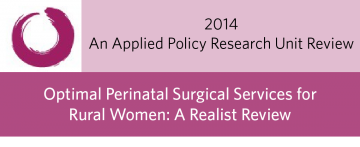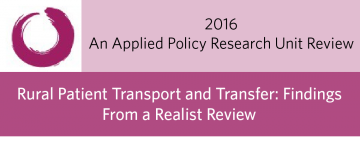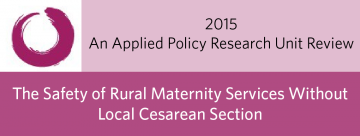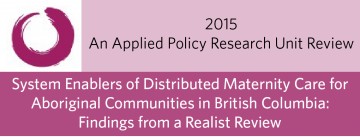
The Applied Policy Research Unit (APRU) is an arm of the Centre for Rural Health Research focused on producing and synthesizing policy relevant research to inform rural health service planning in a timely, user-friendly way.
To download reports and other documents, see APRU Reports.
Team
Rural health services policy analysis and evidence reviews are conducted by a team of academic researchers and rural practitioners with expertise and experience in rural health services, health policy, research synthesis methodologies and knowledge translation strategies. APRU is supported by the Centre for Rural Health Research, the Michael Smith Foundation for Health Research, the Rural Coordination Centre of BC and the Department of Family Practice at the University of British Columbia.
Services offered include:
- Focused review of existing evidence to inform a policy or planning direction
- Primary data collection and analysis to support health policies and programs
- Rapid response evaluation of policy directions for rural communities
Recent project examples:
- A realist review of optimal rural perinatal surgical services
- A review of enablers for distributed models of maternity care for BC’s Indigenous women and communities
- Expert attendance at a symposium to inform gaps in rural research and support generating a strategic research agenda
- Rapid response on the implication of a rural policy direction
Eligibility
If you are a health planner or decision-maker with a need for research evidence on rural health services, we invite a brief statement of interest. This will be followed by a discussion to see how we can best meet your evidence needs to inform policy and planning. The service is offered on a cost-recovery basis. For more information please contact the CRHR office (604-827-2544) or Dr. Jude Kornelsen (jude.kornelsen@familymed.ubc.ca; 250-653-4325).
Links to Our Resources:
Information for Commissioners of APRU Evidence Reviews
Reports
Here you can find details of our work, including downloadable PDFs of each of our reports, shorter policy briefs, and other relevant material.
2016
2015
An examination of international literature related to the safety of primary maternity services without surgical capacity for rural BC.
This broad-ranging review is the first ever to connect competing fields of research that have influenced our understanding of the safety of small volume, low-resource primary maternity units without local surgical capacity. Examining international literature from Canada, Australia, the United States, Norway, New Zealand, Finland, Sweden, Wales, Scotland, England, France, the Netherlands, Denmark, Iceland and Germany, this review finds that greater distance to maternity services is a serious threat to rural and remote women and their babies.
Inside this review, you will find a comprehensive consolidation of research evidence on rural health disadvantage, the safety of primary maternity services, distance to care, the impact of service volume on maternal-child outcomes, sustainability of services and psycho-social risk/safety.
This review was commissioned by Perinatal Services BC (PSBC), BC Women’s Hospital and Health Centre and the University Centre for Rural Health, Australia
An applied examination of enabling factors in returning birth services to rural and remote First Nations communities in BC.
Prepared for the First Nations Health Authority, the Applied Policy Research Unit examined international evidence for and experiences of returning birth to small, rural and remote Indigenous communities. A series of enablers (or levers) in the health services system were explored to develop a concrete awareness of how to build and support culturally resonant, safe and sustainable small birth and birth support services.
The organizing question of the review was:
“What systemically enables the decentralization of maternity services while maintaining safe birth outcomes in rural and remote communities?”
APRU and FNHA agreed to privilege data specific to Indigenous models of care in which cultural and social safety were components of care, and to examine successful and relevant case studies for applicable learning. Over 160 sources were considered across eleven enablers in four models of care.
This short, 4-page document gives a strong overview of the context, importance, and findings of the report, System Enablers of Distributed Maternity Care for Aboriginal Communities in British Columbia: Findings from a Realist Review (found above). The reference list can also be found in the full report.
2014
 An in-depth evidence review and report by the Applied Policy Research Unit on the organization of perinatal surgical services in BC.
An in-depth evidence review and report by the Applied Policy Research Unit on the organization of perinatal surgical services in BC.
This review was commissioned by Perinatal Services of British Columbia and the Ministry of Health. Balancing the international scope of the evidence reviewed with the need for local applicability to the BC health services context, the APRU team used a realist review methodology.
The guiding research question was:
Can we meet the perinatal surgical needs of rural women more effectively through an optimally centralized or optimally decentralized model of care?
Over 190 sources were reviewed from key topics related to rural surgical care, including: the safety and efficacy of surgical models; sustainability of service; satisfaction for all stakeholders; cost; and cost-effectiveness of models of care with differing levels of centralization.
This short, 4-page document gives a strong overview of the context, importance, and findings of the report, Optimal Perinatal Surgical Services for Rural Women: A Realist Review (found above). The reference list can also be found in the full report.


